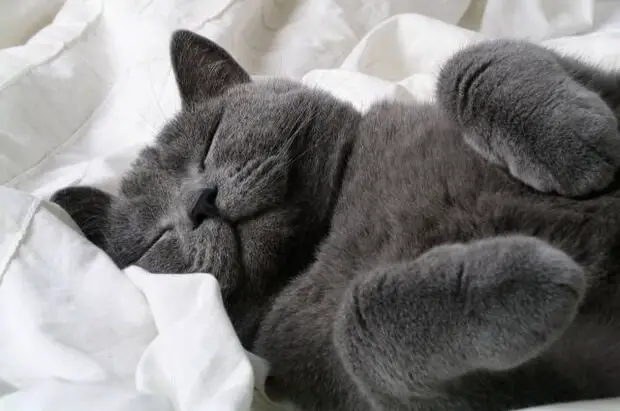Some cat owners cannot imagine their night’s sleep without their beloved furball. Others, on the other hand, declare the bedroom a taboo zone for their cats. The “cat in bed” is also a hairy topic in many partnerships. What are the arguments for and against letting cats sleep in the bed?
Cats Sleeping in Your Bed: A Good Idea?

Proponents of cats in bed report the following benefits for humans and animals:
Cozy pack cuddling
Trample on the blanket with your paws, roll into a ball, and slumber blissfully – cat sleep rituals are nice to look at and are calming. Comfortable purring lowers blood pressure, relaxes, and paves the way to peaceful dreams. Fans of fur noses in bed feel completely at ease with their cuddly cat in the bedroom.
Heat source
Especially in the cold season, some cats are wonderful hot water bottles on four paws. Happy if you have cold feet and share the bed with a velvet paw cuddling close to your feet. Heart-warming: some fur-noses even cuddle under the blanket and hug their slumbering holder.
Security and trust
For many people, the cat is a member of the family. They are happy when the four-legged friend seeks their proximity – even at night. Because this shows the close bond between humans and animals. Two and four-legged friends benefit from the cozy feeling of security.
Reasons You Should Never Let Your Cat Sleep in Your Bed
These potential downsides speak against cats in bed:
Hygiene concerns
Some cat lovers have hygienic concerns about letting their cat into bed. This is not unfounded: Cats can transmit diseases such as skin fungi or parasites – worms, ticks, fleas – to humans.
That is why only healthy cats should go to bed. Many people cannot get used to the thought of cat hair in their sleeping quarters. Not a good prerequisite for cozy nights with cats.
Certain diseases
Anyone who suffers from diseases such as asthma, chronic obstructive pulmonary disease (COPD), or immune deficiencies should rather avoid cats in bed. This also applies to healthy four-legged friends that are free from parasites.
If the disease is not pronounced, compromises are possible – for example a cat at the foot end. However, the velvet paw should not be placed on the pillow of allergy sufferers or asthmatics. Bacteria transmitted by cats can also weaken the chronically ill.
Too uncomfortable
While the biped is slumbering peacefully, many a cat slowly but surely conquers its pillow. From her majestic resting place, she observes in the morning how the owner rubs the painful neck.
Other four-legged friends prefer to slumber on their human – they no longer move so as not to disturb their night’s rest. Tensions are inevitable. You can’t sleep because your four-legged friend is doing gymnastics on the bed at night? It is better to put a comfortable cat basket in the bedroom.
With restless animals: Think about whether the cat is bored during the day and therefore cannot sleep at night.
Mouse alarm
A cat in the bedroom is okay – but a mouse is an absolute no-go? The following “problem” can arise with ambitious four-legged hunters with cat flaps: The velvet paws express their affection for their favorite person with “breakfast in bed”.
Whether dead or living presents – the recipients are at least wide awake. You can prevent this risk – for example, by keeping the cat indoors at night. Some cat flaps are programmable so that the velvet paw cannot go outside at night.
Cat Sleeps in Bed
Depending on whether you have cats outdoors or indoors, the pros and cons have to be weighted differently. The hygiene concerns are lower for indoor cats than for outdoor cats.
However, there are people who simply sleep better in bed without a pet. As with so many things in life, there is no one-size-fits-all solution. The answer to the question “cat in bed?” Is a matter of type. And what about children?
Small children’s rooms should be taboo for cats.
Schoolchildren often sleep better when there is no cat disturbing their bed. By the way: not all dogs and cats like to sleep in the bed. Some prefer to have a comfortable basket all to themselves.
Tips for Cats in Bed
- For outdoor animals: Only allow dewormed and parasite-free cats to go to bed.
- Does your catfight for your pillow? Put a cozy cat blanket on “desired” cat sleeping places.
- Regular brushing ensures less fur loss in bed.
How to Wean the Cat From Sleeping in Bed?
Once the cat is used to sleeping in bed, it is difficult to get used to it. That is why cat owners should consider carefully whether or not they can go to bed before their paws move in. The velvet paw does not understand a back and forth. That speaks against “trial lying” and against exceptions such as “only on weekends”.
Sometimes there are still reasons to ask an experienced four-legged sleeper out of the bedroom. This may be a new partner with a cat hair allergy. Or diseases that speak against slumbering with velvet paws. Unfortunately, the only thing that helps here is to sit down consistently in front of the door and then ignore the protest of the cats.
It can be easier if the cats are two and bed in a basket together. Make it easier for the velvet paw to get used to with a used sleep shirt from you or – if available – the cat blanket that it knows from the bed. Pheromone sprays can also help relax the cat.
Before you go to bed, deal with her especially lovingly and give her plenty of play and cuddles.

